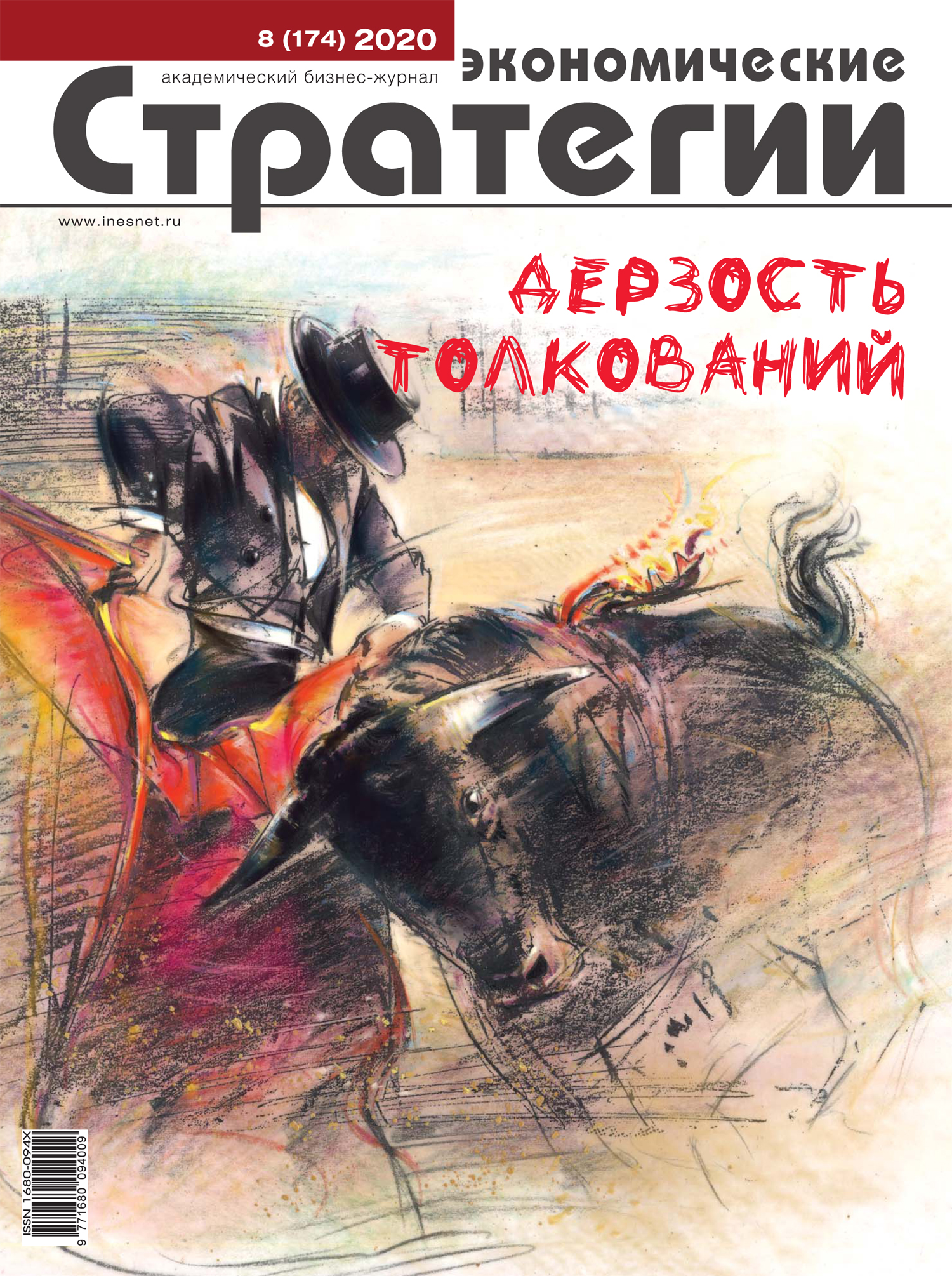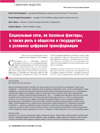Social Networks, Their Basic Factors, as Well as Their Role in Society and the State in the Context of Digital Transformation
DOI: 10.33917/es-8.174.2020.26-35
Society is historically associated with the state, which plays the role of an institution of power and government. The main task of the state is life support, survival, development of society and the sovereignty of the country. The main mechanism that the state uses to implement these functions is natural social networks. They permeate every cell of society, all elements of the country and its territory. However, they can have a control center, or act on the principle of self-organization (network centrism). The web is a universal natural technology with a category status in science. The work describes five basic factors of any social network, in particular the state, as well as what distinguishes the social network from other organizational models of society. Social networks of the state rely on communication, transport and other networks of the country, being a mechanism for the implementation of a single strategy and plan. However, the emergence of other strong network centers of competition for state power inevitably leads to problems — social conflicts and even catastrophes in society due to the destruction of existing social institutions. The paper identifies the main pitfalls using alternative social networks that destroy the foundations of the state and other social institutions, which leads to the loss of sovereignty, and even to the complete collapse of the country.
References:
1. McCarthy C. Facebook: One Social Graph to Rule Them All? CBS Interactive Inc., 2010.
2. Kristakis N., Fauler Dzh. Svyazannye odnoi set’yu: kak na nas vliyayut lyudi, kotorykh my nikogda ne videli [Connected by One Network: How We are Affected by People we’ve Never Seen]. Moscow, Yunaited Press, 2011, 361 p.
3. Sorokin P. Chelovek. Tsivilizatsiya. Obshchestvo [Person. Civilization. Society]. Moscow, 1992, 304 p.
4. Semenov Yu.I. Vvedenie vo vsemirnuyu istoriyu. Vyp. 2. Istoriya pervobytnogo obshchestva [Introduction to World History. Issue 2. History of Primitive Society]. Moscow, MFTI, 1998, 192 p.
5. Sergeitsev T.N., Mostovoi P.P., Kulikov D.E. Ideologiya russkoi gosudarstvennosti [Ideology of Russian Statehood]. Saint Petersburg, Piter, 2020, 890 p.
6. Andreeva G.M. Sotsial’naya psikhologiya [Social Psychology]. Moscow, Aspekt Press, 2006, 362 p.
7. Kostyuchenko L.G., Reznik Yu.M. Vvedenie v teoriyu lichnosti: sotsiokul’turnyi podkhod [Introduction to Personality Theory: Socio-Cultural Approach]. MGU im. M.V. Lomonosova, In-t cheloveka RAN. Moscow, Nezavisimyi institut grazhdanskogo obshchestva, 2003, 268 p.
8. Ryzhov R.V. Nauchno-issledovatel’skii i prakticheskii “Sotsial’nyi khabbl” dlya universitetskogo soobshchestva: Sb. materialov XI Mezhdunarodnoi nauchnoi konferentsii “Sorokinskie chteniya – 2017” “Universitet v global’nom mire: novyi status i missiya” [Research and Practical “Social Hubble”
for the University Community: Collection of Materials of the XI International Scientific Conference “Sorokin Readings – 2017” “University in a Global World: New Status and Mission”]. Moscow, MAKS Press, 2017, pp. 225–227, available at: https://www.socio.msu.ru/documents/science/Sorokinskie_
sbornik_2017.pdf.
9. Vasil’ev N. Metricheskie prostranstva [Metric Spaces]. Kvant (fiziko-matematicheskii zhurnal), 1970, no 10, available at: http://kvant.mccme.ru/1970/10/metricheskie_prostranstva.htm.
10. Uilson R.Dzh. Vvedenie v teoriyu grafov [Introduction to Graph Theory]. Moscow, Dialektika, 2020, 240 p.
11. Ryzhov V.A. Rol’ promyshlennogo kompleksa dlya suvereniteta strany v novom mirovom poryadke i stanovlenie IT-otrasli posle tsifrovoi transformatsii obshchestva [Role of the Industrial Complex for the Country’s Sovereignty in the New World Order and Emergence of the IT Industry After Digital Transformation of Society]. Ekonomicheskie strategii, 2020, no 1, pp. 82–91, DOI: 10.33917/es-1.167.2020.82-91.
12. Perkins Dzh. Ispoved’ ekonomicheskogo ubiitsy [Confessions of an Economic Killer]. Moscow, Pretekst, 2012, 352 p.
13. Ageev A.I. Novyi konets istorii? [New End of the History?]. Izborskii klub, 2020, July, 21, available at: https://izborsk-club.ru/19648.
14. Bard A., Zoderkvist Ya. Netokratiya. Novaya pravyashchaya elita i zhizn’ posle kapitalizma [Netocracy. New Ruling Elite and Life After Capitalism]. Saint Petersburg, Stokgol’mskaya shkola ekonomiki v Sankt-Peterburge, 2004, 352 p.



